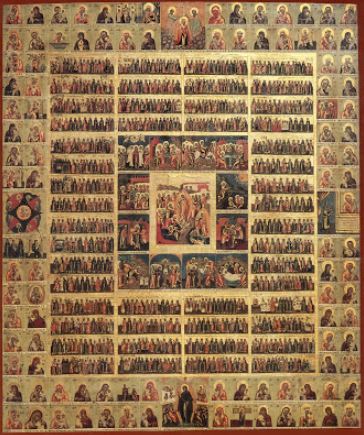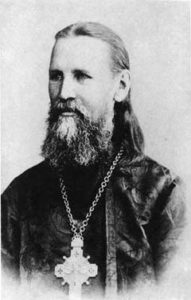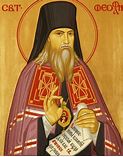SSCORRE!
Saint Sophia Cathedral
Online Resources for our Religious Edification

Topic of the Week –
The Importance of the Lives of the Saints for our Spiritual Lives
“…I spoke recently to an Orthodox priest who had converted to Orthodoxy from Protestantism. He told me that, when he was received into the Church, the officiating priest told him: “You will never be truly Orthodox without reading the Lives of the Saints.” Later, when he himself became a priest, he found that the most pious people in the churches are those who read the Lives of the Saints, and that those who make the most progress in the spiritual life are those who read the Saints’ Lives….”-St. Justin Popovich

The Significance of the Lives of the Saints
“…St. Justin [Popovich] saw the Lives of the Saints as bearing witness to one life: the Life in Christ. He wrote:
- “What are Christians? Christians are Christ-bearers, and, by virtue of this, they are bearers and possessors of eternal life…. The Saints are the most perfect Christians, for they have been sanctified to the highest degree with the [struggles] of holy faith in the risen and eternally living Christ, and no death has power over them. Their life is entirely Christ’s life; and their thought is entirely Christ’s thought; and their perception is Christ’s perception. All that they have is first Christ’s and then theirs…. In them is nothing of themselves but rather wholly and in everything the Lord Christ.”
This is an amazing thing that St. Justin is saying: when we read the Lives of the Saints, we are reading the Life of our Lord Jesus Christ. This in itself should be enough to convince us of the importance of filling our souls with the Lives of the Saints.…we might well ask ourselves if Orthodox spiritual life is even possible without the testimony of the Lives of the Saints. The answer to this, I believe, must be “no.” True spiritual life begins when we live in Christ and Christ lives in us, right here on this earth. And the Lives of the Saints bear witness to us that the Life of Christ on earth did not end with His Ascension into Heaven, nor with the martyrdom of His Apostles. His Life continues to this day in His Church, and is seen most brilliantly in His Saints. And we, too, in our own spiritual lives, are to enter into that continuing, never-ending Life….
The Orthodox Faith is not, first of all, of the head. First of all, it is of the heart: it is felt and believed by the heart. Through the Lives of the Saints, we develop an Orthodox heart.Our monastery’s co-founder, Fr. Seraphim Rose, emphasized constantly this “Orthodoxy of the heart,” especially in his writings and talks at the end of his life; and he frequently referred to Lives of the Saints as a means of developing this….”
Read the entire article here. Read about Parenting with the Help of Saintshere.
Purchase My Life in Christ: The Spiritual Journals of Saint John of Kronstadthere, Man of God: Saint John of Shanghai and San Franciscohere.
Preschool/Elementary School:
An excerpt from On Learning About the Saintsis below:
“In the Orthodox Church, we are each admonished to learn about the saints. We quote the Holy Fathers and are encouraged to study the lives of all the saints who have gone before us. But do we ever take a moment to consider why we are encouraged to do this? What value is there in learning about the life of someone who lived so long (years or even millenia) before us?
- When we learn about the saints, we can see that they struggled, too.
- What is important is not victory or the position of a victor, but rather the labor of striving towards God and devotion to Him.” ~St. John Maximovitch
- We can observe the ways in which the saints succeeded (and sometimes also failed!), and learn from them.
- “…some falls and relapses of the former sinful life are inevitable. Do not let this disturb you, do not despond. Rome was not built in a day. Everything takes time. It is through many trials and great struggle that we each enter the Kingdom of God… Sometimes this process of rising proceeds quickly, at times it slows down…Do not be discouraged when you see no improvement. One thing is needful: try to live according to the Gospel commandments…If you do succumb [to sin], repent before the Lord, ask forgiveness, and rise to fight again. And so until death.” ~Abbot Nikon
- We can use the saints’ lives as a guide and/or measuring stick to help ourselves stay on track.
- “A person can become a saint anywhere… At your work, whatever it may be, you can become saints – through meekness, patience and love. Make a new start every day, with new resolution, with enthusiasm and love, prayer and silence – not with anxiety so that you get a pain in the chest. If it happens, for example, that you are given tasks to do that fall outside the remit of your duties it is not right for you to protest and become irritated and complain. Such vexations do you harm. Look on all things as opportunities to be sanctified.” ~St. Porphyrios
- We can ask the saints to pray for us.
- “…And when we pray to them [the saints], then the Holy Spirit hears our prayers, and our souls feel that they are praying for us.” ~St. Silouan the Athonite
Through the prayers of our Holy Fathers, of Thy Most Pure Mother, and of all the Saints, have mercy on us and save us. Amen.”
Read about lives of Saints of Recent Decades here. Listen to free podcasts from the Lives of the Saints here. Purchase individual books or the entire series from the Paterikon (Encyclopedia of Saints) here, or the book A Child’s Paradise of Saintshere.
Middle School:
How to Make Use of the Lives of the Saints “…First, we look to the Saints as our examples…. As Christians, we want to grow in the likeness of Christ, to have that likeness shine in us. For this to occur, we need to look often to the Saints to see that shining likeness: we must look to them for real, practical examples of how to live. St. Basil the Great gives this analogy:
- “Just as painters, in working from models, constantly gaze at their exemplar and thus strive to transfer the expression of the original to their own artistry, so too he who is eager to make himself perfect in all kinds of virtue must gaze upon the Lives of the Saints as upon statues, so to speak, that move and act, and must make their excellence his own by imitation.”
- “These close friends will be the guides of our choice and a great comfort to us along the straight and narrow way that leads to Christ. We are not alone on the road or in the struggle. We have with us our Mother, the All-Holy Mother of God, our Guardian Angel, the Saint whose name we bear, and those close friends we have chosen out of the Great Multitude of Saints who stand before the Lamb (Rev. 7:9). When we stumble through sin, they will raise us up again; when we are tempted to give up hope, they will remind us that they have suffered for Christ before us, and more than us; and that they are now the possessors of unending joy. So, upon the stony road of the present life, these holy companions will enable us to glimpse the light of the Resurrection. Let us search, then, in the Lives of the Saints, for these close friends, and with all the Saints let us make our way to Christ….”
Purchase The Life of Saint John the Wonderworker of Shanghai and San Franciscohere, The Story of the Holy Hierarch John Maximovitch the New Wonderworkerhere, The Life of the Righteous Father John the Wonderworker of Kronstadthere, The Life of Saint Seraphim, Wonderworker of Sarovhere.
High School:
The Call to Sanctity
“…In remembering the Saints of God according to the testament of St. John Maximovitch, we must always remember, as he did, that each one of us is called to be a Saint.The Saints…are the most perfect Christians, who have been sanctified to the highest degree… those who show forth in themselves a height of righteousness and are filled with the Grace of God to such an extent that it flows from them upon those around them… deified human beings, who are filled with the Grace, the Uncreated Energies of God, and who live the Divine-human life of Christ in the Church.Every Orthodox Christian partakes to some extent of this Divine-human life.St. Justin Popovich writes: “Christ’s life is continued through all the ages; every Christian is of the same body with Christ, and he is a Christian because he lives the Divine-human life of this Body of Christ as Its organic cell.”Life according to the Gospel, holy life, Divine life, that is the natural and normal life for Christians. For Christians, according to their vocation, are holy.” To become completely holy, both in soul and in body—that is our vocation.This is not a miracle, but rather the norm, the rule of faith. “Having united themselves spiritually and by Grace to the Holy One—the Lord Christ—with the help of faith, Christians themselves receive from Him the Holy Energies that they may lead a holy life.”It is our task as Christians, then, to acquire more and more of this Divine-human life, to go deeper and deeper into it, to grow more and more in the likeness of Christ, to be filled with more and more of his Grace….
A Message from Maria Spanos
I am passionate about our Orthodox Christian faith and seek to help others learn as much as they can about it. My purpose here is to share online resources that help strengthen our relationship with Christ and bind us closer to His Church. I believe they are invaluable in learning about our precious Orthodox Tradition, and are a great aid for teaching family members, friends and others about Orthodoxy. ~Maria
Two of my favorite quotes:
 “A true Christian behaves in this life so that it may be a preparation for the future one and not only a life here below. In his actions, he does not think what will be said of him here but of what will be said there in heaven; he represents to himself that he is always in the presence of God, of the angels and all the saints, and remembers that someday they will bear witness of his thoughts, words, and deeds.” — Saint John of Kronstadt
“A true Christian behaves in this life so that it may be a preparation for the future one and not only a life here below. In his actions, he does not think what will be said of him here but of what will be said there in heaven; he represents to himself that he is always in the presence of God, of the angels and all the saints, and remembers that someday they will bear witness of his thoughts, words, and deeds.” — Saint John of Kronstadt
__________________________________________________________

“Of all the holy works, the education of children is the most holy.”
— St. Theophan the Recluse







